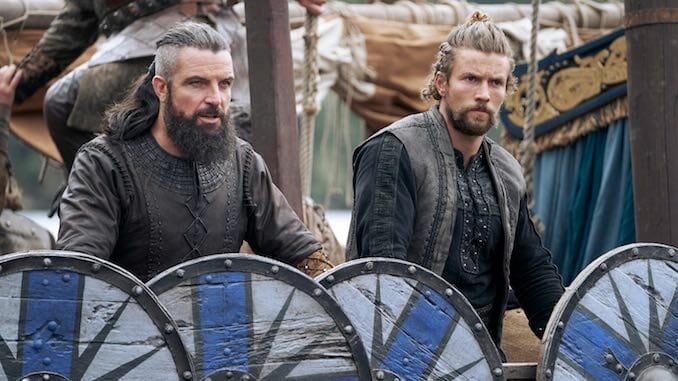Vikings: Valhalla: Netflix’s Sequel Series Is Entertaining, Historically Iffy
Photo Courtesy of Netflix
For history buffs, there is something just a little extra fascinating about those periods in human existence where a society’s written accounts begin to emerge, and where the fog of either nothingness or myth begins to clear into something like truth. In other words, that moment when there is recorded history, and the history is real. It happens at different times for different cultures, and much of what we know about the early Vikings comes from the more literate societies they raided. But in the 13th century, the Icelandic Sagas were written, and they dealt with events all the way back to the 9th century. As you might imagine for histories written 400 years afterwards and based on oral tradition, some of the facts are up for dispute. A figure like Ragnar Lothbrok—the Viking raider of the 800s and the central figure of the first four seasons of Vikings, originally broadcast on the History Channel—is today considered a kind of composite figure, the tales of him either rife with inaccuracies or flat-out myth. But the strange thing is, the men recorded as his sons are very real historical figures whose existence is not in doubt. How can they be real when the father is a legend? Maybe because they claimed lineage to augment their own fame, which was true of later kings, too. Or maybe Lothbrok was real.
We don’t know. What we do know is that less than 100 years later, when Erik the Red and his son Leif Erikson explored and settled Greenland, and Erikson became the first European to land on the continent of North America, we are dealing with valid historical figures. The mist has cleared, and this is actual history. There’s something almost magical about it, this passage from myth to truth, and it’s that time jump that Netflix’s sequel series Vikings: Valhalla makes.
Created by Jeb Stuart (Die Hard, The Fugitive), the eight-episode Valhalla is the story of Erikson (Sam Corlett) and his sister Freydis (Frida Gustavsson), mixed in with the conquest of King Canute (Bradley Freegard), the Dane who invaded England in 1015 and became king for almost 20 years. The story is exciting, though the history is, frankly, a mess—key events are conflated to make a tidy narrative, and figures like Erikson and Freydis are placed where they never seemed to have existed in real life. For one thing, Erikson is depicted as a young man during Canute’s conquest, sailing with the Danish king in order to save his sister’s life, when in fact he would have been just a few years from death at that point, and far away in Greenland. His sister Freydis, judging by the sagas, seems to have been a bit of a nightmare, with all of the murderousness that saw her father Erik the Red exiled over and over again, but here she’s devout and loyal (though equally fierce). For another, Canute’s voyage is portrayed as a revenge mission for the St. Brice’s Day Massacre, when the English king had Danish settlers put to death, but in fact his invasion came more than a decade after the fact.
In other words, if you’re looking for an accurate retelling of some of the most consequential explorers and invaders in European history, look elsewhere. The writers have taken this first period of Norse historical illumination and cast it back into shadow, clearly more comfortable with the storytelling freedom given to them by the age of myth, when there are no facts to stumble over. History, for them, provides a nice outline for the story, and within that they feel free to pick and choose which elements work and which are omitted, and when to simply make something up entirely.
This is not much of a critique, though. Despite the fact that the original series (created by Michael Hirst) was on the History Channel, none of this was ever strictly historical, and the judgment of Vikings was always more about whether it give a sense of the history, and whether the story was any good.